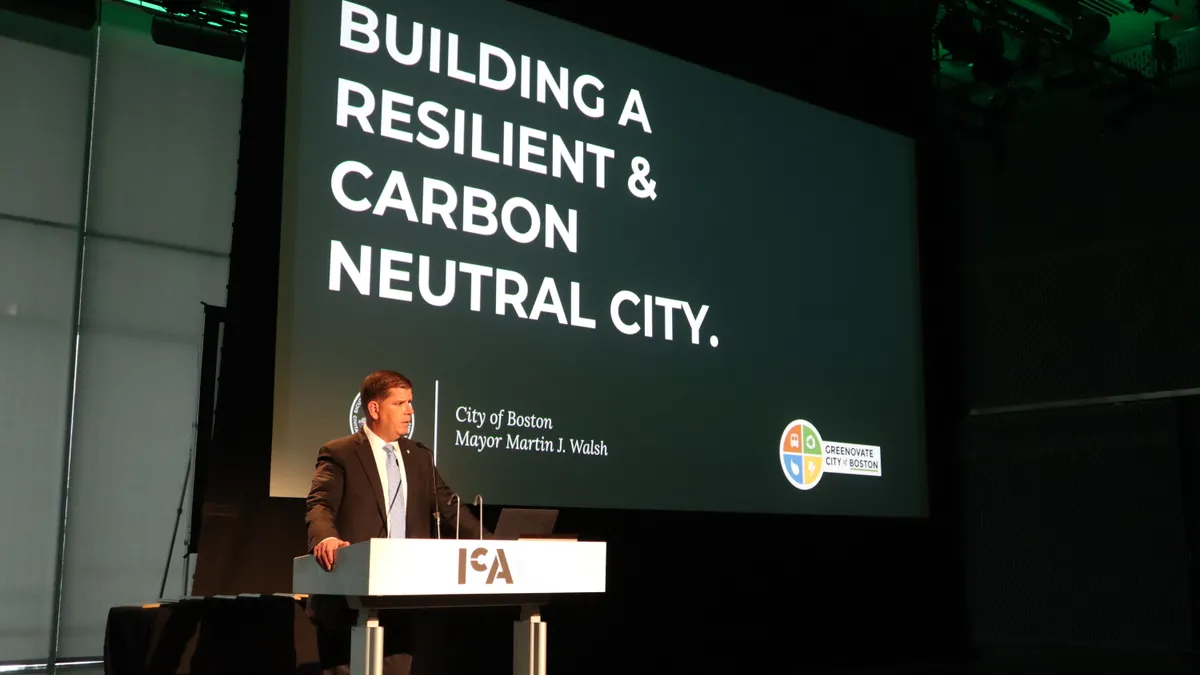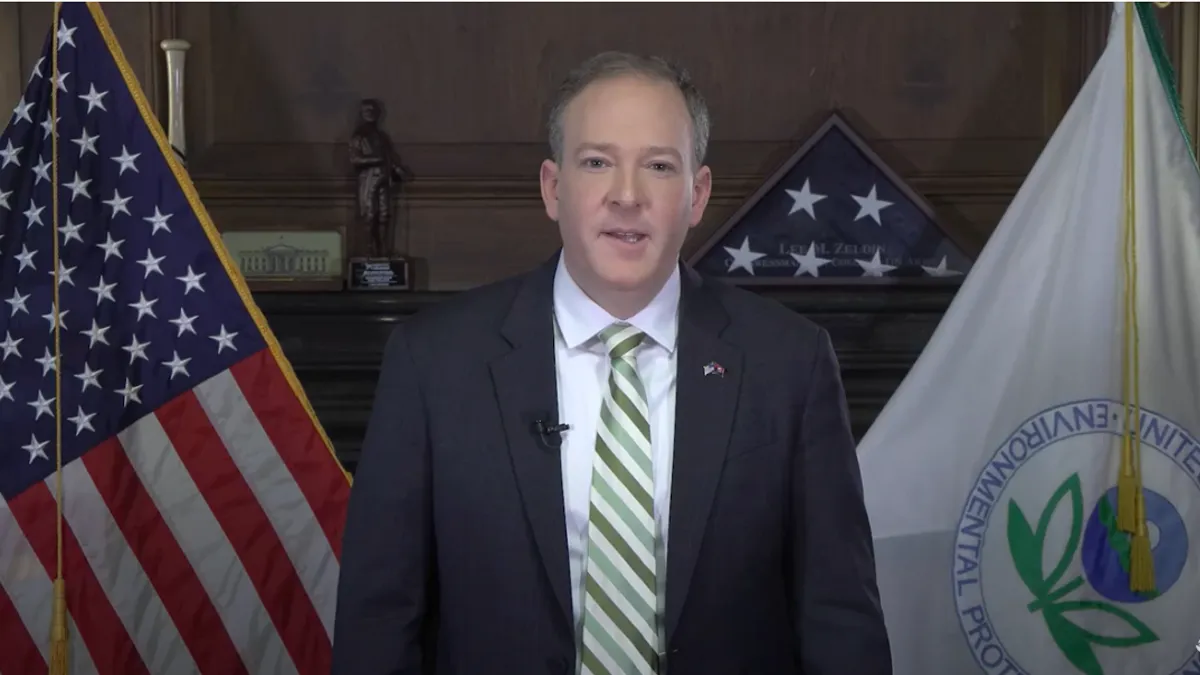Since its founding in 2014, Los Angeles Mayor Eric Garcetti has been the bold leader of Climate Mayors, a coalition of nearly 500 U.S. mayors committed to climate mitigation. As Garcetti gears up for new responsibilities under an incoming Biden-Harris administration, his leadership baton has been passed to Boston Mayor Marty Walsh.
Climate action has been a top priority for Walsh since he became Boston's mayor in 2014, leading that city to invest in a number of initiatives including a zero net carbon standard for buildings, an urban forest plan and a recently-unveiled zero-emission vehicle roadmap. Yet his introduction to the role of Climate Mayor chair comes at a unprecedented time of national recovery — with demands for effective climate leadership higher than ever.
Smart Cities Dive caught up with Walsh to learn his vision for national climate leadership, his hopes for Boston's climate future and his thoughts on serving under a presidential administration that prioritizes climate action.
The following interview has been edited for clarity and brevity.
SMART CITIES DIVE: What are the challenges or opportunities you're anticipating in this role that Garcetti may not have faced?
MAYOR MARTY WALSH: First and foremost, a White House that believes in science. That's one of the biggest differences there's going to be.
When Mayor Garcetti took over, President Obama was president, [the country] was in C40, we were moving forward on climate resiliency and we had an administration in Washington that was working on climate goals — not just in the United States but throughout the country and throughout the world. And then for the last three and a half year, it's been really difficult.
I'm honestly looking at Climate Mayors as an opportunity ... As mayors are close to the people we serve, we see firsthand how climate change is impacting different communities, different neighborhoods. And I think that that's important. I think what it really does is it lays down a foundation — that wasn't there for President Obama and the Obama administration — that's going to be there for the Biden administration of cities around America that have already taken some major action on climate resiliency.
What type of federal-level collaboration to you anticipate to see around climate under the Biden administration?
WALSH: I'll use Boston [as an example] but it could be any city in America: Our goal in Boston is cutting emissions, investing in green jobs, preparing our coastline for sea level rise and planning to protect vulnerable populations from climate impacts. Having that framework here in Boston, and having an administration that is going to make investments in all of this, so it's not just investments that we're making as a city ... I think the investments are important.
[Next is] really having a concrete plan on putting climate into policy. President-elect Biden has talked about climate being part of the infrastructure bill, talked about it being part of education ... they're really going to incorporate climate resiliency and a whole bunch of different steps in the federal government and some of that goes right with the policies that American cities have laid out for themselves.
I also think being carbon neutral [will be a priority]. We have a climate action plan that outlines a five-year roadmap toward achieving carbon neutrality by 2050, which is the goal laid out in the Paris Climate accord. Now having a Biden administration, it's not just Boston doing that. It's going to be the whole country focused on that. And I think that having that partner in the White House ... they're going to come up with some policies we can follow, we're going to have policies that we can advocate for. So we're really having a robust conversation that is not going to be discredited on the first time you have a conversation, it's not going to be pushed aside. There might be different ways of getting there, but having that dialogue and having that understanding is really important.
Are there any particular cities or regions that are not involved in Climate Mayors that you're hoping to bring into the conversation?
WALSH: There's a couple states in the Midwest that we don't have. What I want to do is empower mayors around the country to be more active, not just a participant in Climate Mayors but being more active and taking a role in the organization. As we think about moving forward, I think that's key.
I think that we have to make sure people aren't afraid of talking about the climate and they understand what they're talking. Some folks have made climate conversation almost like, I don't want to say 'anti-American' ... but what we're seeing around the United States of America — whether it's the hurricanes in the southern part of the country, whether it's the panhandle or the Louisiana coast, the forest fires that L.A. has been experiencing, sea level rise at the East Coast is experiencing — those are real existential threats to our society. They're real threats to individuals.
I think having more conversations as Climate Mayors to mayors round the country about the impacts of climate ... you know, I compare it to COVID. In some ways, when you look at the disparities of COVID are in our communities of color, in a lot of poor communities, that's where the climate vulnerabilities are. In a lot of cities, you can take the COVID map and [overlap it with] the climate map, it's in the same areas.
Houston Mayor Sylvester Turner is your counterpart as co-chair of Climate Mayors. How does he complement your leadership?
WALSH: First and foremost, his experience. This mayor, he's lived with hurricanes coming in. His first term in Houston was very difficult, he had a hurricane that came in and flooded out the city, number one. Number two, he's very passionate about the issue. And, I think geography matters and when you have a mayor from the Northeast and a mayor from the southern part of the country. That helps us. Geography really matters in these conversations. You can't be an organization with one focus ... There's different threats in different places that we all experience, and I think having that experience with Mayor Turner and that he's really passionate about the issues is important.
Let's look more locally. I recently reported on Boston's electric vehicle (EV) roadmap, which has a particular focus on equity. Would you say the events of this year have influenced how your leadership prioritizes equity in planning?
WALSH: We prioritized equity prior to 2020, but the sense of urgency has made it that much more focused. We always focus what we're doing with our climate and a lot of our issues on equity, but the pandemic and the systemic racism that we're seeing ... I think there's a new urgency of coming out of coronavirus, going into 2021 and not returning back to normal but creating a new normal. And part of that is about equity and resiliency.
The topic of car-free streets is something that really picked up this year, and was mentioned in the EV roadmap. How do electric vehicles fit into the goal of eventually moving away from cars?
WALSH: That's where the federal government comes into play. We need some real investment and electric vehicles are a big part of it. It's also about investing in public transportation and having good strong reliable public transit.
One of the criticisms of our system here in Massachusetts is that pre-COVID it wasn't reliable, and now people are taking it because people are working from home. So I think having an investment from the federal government in public transit and rail is really important.
The City of Boston zero-emissions vehicle roadmap, as you know, it's a long-term strategy to reach Boston's transportation electrification goals ... I think that what we have to do is we need widespread support and adoption of electrification, we need to ensure affordable access to charging infrastructure, and that will help us really think about turning to electric vehicles ... So rather than having the vehicles come in and then building the infrastructure, we try to build the infrastructure and then the vehicles will follow.
It is rumored you will campaign for a third mayoral term. Whatever leadership you pursue in 2021, what will your key focuses be when it comes to climate?
WALSH: It really is, first and foremost with the Climate Mayors, as we go back into the Paris Climate Agreement, carrying the agreement and its terms to the fullest. I think we need to continue to work on our buildings in the City of Boston, so buildings are being built at zero-carbon standards and also looking at how do we do that across the board. I think investing in green jobs, cutting emissions, preparing for sea level rise ... And also protecting the most vulnerable populations from the climate impacts. All of those.
There's not one or two things you can do. So I think working here in Boston, staying laser-focused here in Boston, but also working on a national level to make sure that my colleagues around the country continue to focus as well.




















